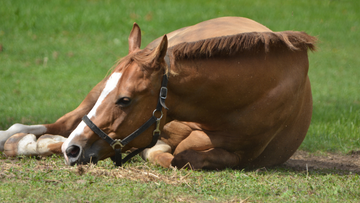Equine Sleep Patterns
Horses are prey animals, so their sleep patterns are centered around survival. They can sleep standing up or lying down. Generally speaking, horses receive more rest when lying down because their bodies truly relax.
On average, horses sleep between 3 and 5 hours daily, but not in one continuous stretch. Instead, they take short naps throughout the day. They will only lie down for a deeper sleep when they feel safe.
Slow-Wave Sleep (SWS)
Horses can rest when they are standing. This type of sleep is known as slow-wave sleep (SWS). SWS is considered non-REM sleep, and it allows the horse to rest while still being alert. Overall, SWS is not a deep state of sleep, but it still provides the horse with some rest.
Paradoxical Sleep (REM)
The deepest and most restorative sleep for horses, paradoxical or REM sleep, happens only when they lie down. During REM, a horse's body fully relaxes, and it experiences the most restful sleep. However, a horse’s senses are not on alert, which can be dangerous in the wild.
Factors Influencing Sleep
Several factors can impact a horse’s sleep pattern. This is true for both SWS and REM sleep:
- Safety and familiarity with the environment
- Pain or discomfort, which can disrupt sleep
- Company of other horses
How does a horse sleep standing up?
Horses sleep standing up to get a little bit of rest when they need to stay alert. Their legs have a locking mechanism that allows them to relax without falling over. When sleeping, a horse will spread his legs apart for balance and drift to sleep. His eyes will likely be open.
The Reasons Horses Lay on Their Sides

Do not immediately stress out if you see your horse lying on his side. There are several reasons why your horse may be lying down:
- Sleep: Horses lie on their sides to enter a deep REM sleep, allowing them to fully relax.
- Body Comfort: Lying down feels better after standing for a long time. It eases pressure on their joints and muscles.
- Natural Instincts: Lying down to rest is natural for horses. They can still maintain some awareness even while resting.
- Recovery from Exhaustion: A tired or unwell horse may need to lie down to fully rest and recover.
- Environmental Factors: Horses are more likely to lie down when they feel safe. Stressful or uncomfortable conditions can keep them from resting properly.
Is laying on his side dangerous for my horse?
Lying down allows your horse to rest deeply, but it can also have some risks that owners should be aware of.
- Pressure Sores: Lying on bony areas for too long can cause sores, which may become infected.
- Breathing Problems: Lying down too long can make it harder for a horse to breathe. In this case, the horse will develop respiratory distress.
- Circulation Issues: Lying down too long can slow blood flow. It can cause swelling or tissue damage.
If you see your horse struggling to stand up or in obvious pain, contact your veterinarian right away. Paying attention to your horse’s rest habits is essential for their health and well-being.






















